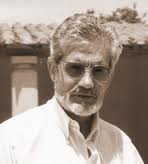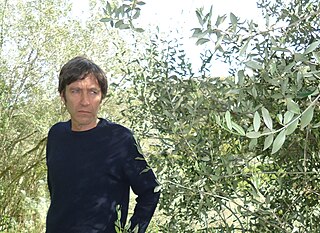This article includes a list of general references, but it lacks sufficient corresponding inline citations .(August 2013) |

Flavio Soriga (born 1975 in Uta, Sardinia) is an Italian writer.
This article includes a list of general references, but it lacks sufficient corresponding inline citations .(August 2013) |

Flavio Soriga (born 1975 in Uta, Sardinia) is an Italian writer.
Flavio Soriga is the youngest representative of the Sardinian literary nouvelle vague, aka Sardinian Literary Spring, namely the Sardinian narrative of today in the European arena, started by Giulio Angioni, [1] Salvatore Mannuzzu and Sergio Atzeni, after the works of prominent figures such as Grazia Deledda, Emilio Lussu, Giuseppe Dessì, Gavino Ledda, Salvatore Satta.
Winner in the 2000 of the Italo Calvino Prize (for unpublished works) with the collection of short stories Diavoli di Nuraiò, Flavio Soriga won in 2003, with the detective novel Neropioggia, the Grazia Deledda Prize. In 2007 he was granted by the University of Vienna the donation of the Foundation Abraham Woursell (HALMA network) for young writers:. [2] In 2008, with the novel Sardinia Blues he won the Mondello Prize, and in 2009 the Piero Chiara Prize with the collection of short stories L'amore a Londra e in altri luoghi.
He currently lives in Rome, where he works as a free lance for Italian newspapers and televisions.
Flavio Soriga is affected by Thalassemia, in his novel Sardinia Blues speaks of his disease. [3]

Grazia Maria Cosima Damiana Deledda, also known in Sardinian language as Gràssia or Gràtzia Deledda, was an Italian writer who received the Nobel Prize for Literature in 1926 "for her idealistically inspired writings which with plastic clarity picture the life on her native island [i.e. Sardinia] and with depth and sympathy deal with human problems in general". She was the first Italian woman to receive the prize, and only the second woman in general after Selma Lagerlöf was awarded hers in 1909.

Nuoro is a city and comune (municipality) in central-eastern Sardinia, Italy, situated on the slopes of Mount Ortobene. It is the capital of the province of Nuoro. With a population of 36,347 (2011), it is the sixth-largest city in Sardinia. Its frazione (borough) of Lollove is one of I Borghi più belli d'Italia.

Alberto Pincherle, known by his pseudonym Alberto Moravia, was an Italian novelist and journalist. His novels explored matters of modern sexuality, social alienation and existentialism. Moravia is best known for his debut novel Gli indifferenti and for the anti-fascist novel Il conformista, the basis for the film The Conformist (1970) directed by Bernardo Bertolucci. Other novels of his adapted for the cinema are Agostino, filmed with the same title by Mauro Bolognini in 1962; Il disprezzo, filmed by Jean-Luc Godard as Le Mépris ; La noia (Boredom), filmed with that title by Damiano Damiani in 1963 and released in the US as The Empty Canvas in 1964 and La ciociara, filmed by Vittorio De Sica as Two Women (1960). Cédric Kahn's L'Ennui (1998) is another version of La noia.
Gavino Ledda is an author and a scholar of the Italian language and of Sardinian. He is best known for his autobiographical work Padre Padrone (1975).
Sergio Atzeni was an Italian writer.
Nicola Tanda was an Italian philologist and literary critic. He studied under Ungaretti and Sapegno at Rome. He was for over thirty years professor at the University of Sassari, first specialising in Italian literature, and then later in Sardinian philology and Sardinian literature. He was a leading advocate for minority languages and their literary expression in the island of Sardinia, including the Sardinian language and Algherese Catalan. As such he was an honorary member of ANPOSDI. He wrote the new Philology of Italians based on the European Charter for Regional or Minority Languages. He was founder and President of the Sardinian PEN Club. He was President of the jury of the Premio Ozieri literary prize founded in 1956 to promote new works composed in Sardinian tongues. He founded in 2003 the Centre for Study of Sardinian Philology. As an editor/director he has guided the publication of over 100 volumes written in Sardinian languages.

Giulio Angioni was an Italian writer and anthropologist.

The literature of Sardinia is the literary production of Sardinian authors, as well as the literary production generally referring to Sardinia as an argument, written in various languages.

Salvatore Mannuzzu was an Italian writer, politician, and magistrate.

Salvatore Niffoi is an Italian writer.

Alberto Capitta is an Italian writer.
Sardinian Literary Spring is a definition of the whole body of the literature produced in Sardinia from around the 1980s onwards.
The Ways of Sin is a 1946 Italian historical melodrama film directed by Giorgio Pastina and starring Jacqueline Laurent, Leonardo Cortese and Carlo Ninchi. The film is a melodrama set in Sardinia at the beginning of the twentieth century. It is based on a novel by Grazia Deledda. The film was shot in the Apennine Mountains rather than Sardinia.

Michela Murgia was an Italian novelist, playwright, and radio personality. She was a winner of the Premio Campiello, the Mondello International Literary Prize and Dessì prize, and was an active feminist and left-wing voice in the Italian public scene, speaking out on themes such as euthanasia and LGBTQ+ rights.
Dolores Turchi is an Italian writer.

Milena Agus is an Italian author from Sardinia. She is one of the leading novelists in the so-called Sardinian Literary Spring which began in the 1980s and which includes other international names such as Michela Murgia.

Salvatore Satta was an Italian jurist and writer. He is famous for the novel The Day of Judgment (1975), and for several important studies on civil law.
The Istituto superiore regionale etnografico is an institution based in Nuoro (Sardinia), established in 1972 by the Regional Council of Sardinia.

The 1926 Nobel Prize in Literature was awarded to the Italian author Grazia Deledda "for her idealistically inspired writings, which with plastic clarity picture the life on her native island and with depth and sympathy deal with human problems in general." She was the second Italian and second female Nobel laureate in literature.